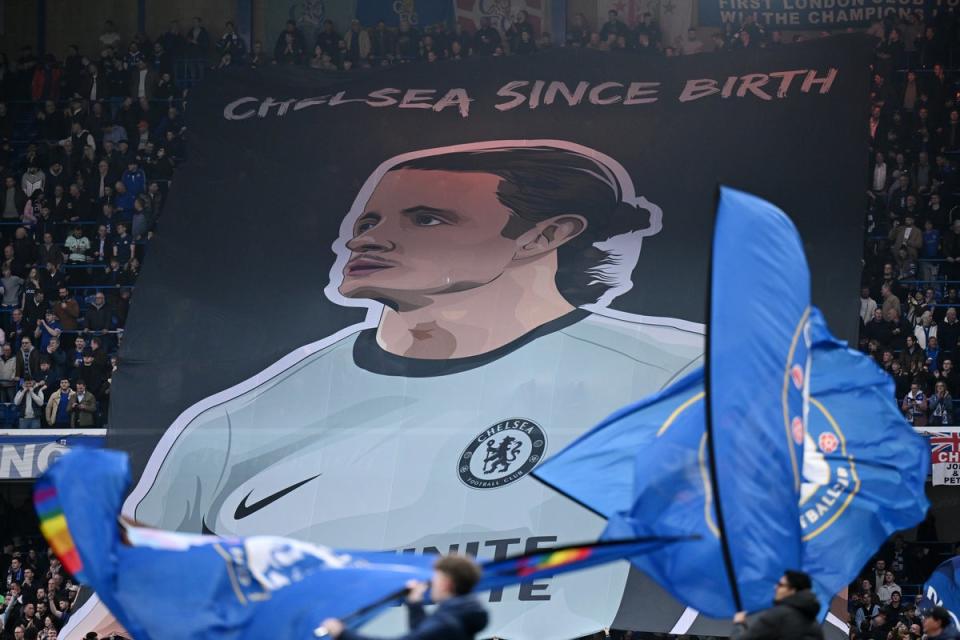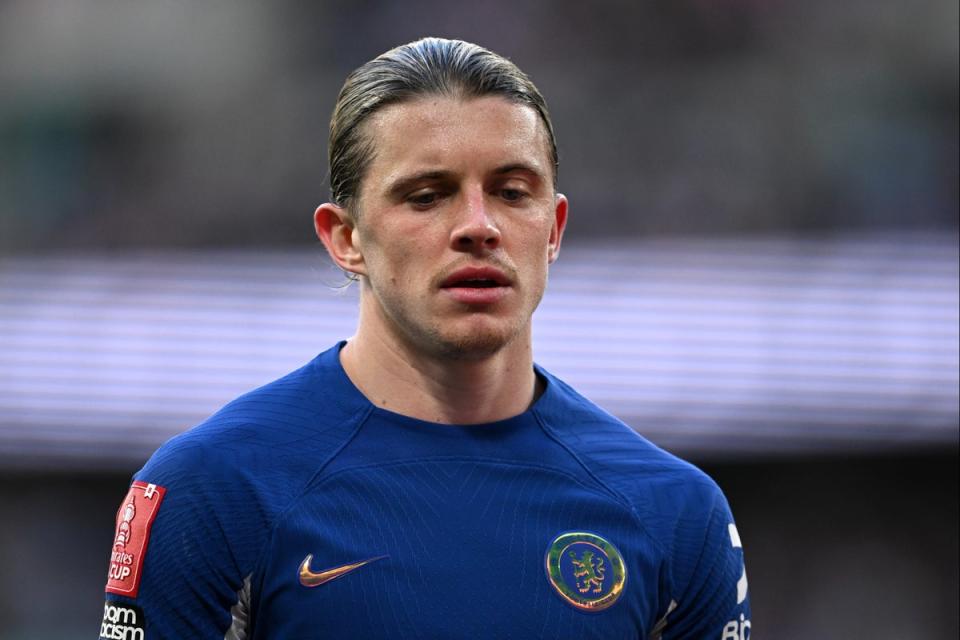Conor Gallagher was Chelsea’s identity crisis in human form
There was a huge flag at Stamford Bridge last season. It featured a picture of Conor Gallagher and three words: “Chelsea since birth”. All of which explains why Chelsea have sold him. The surprise lies only in the destination, not the departure.
The midfielder’s imminent move, to Atletico Madrid, has felt inevitable since Clearlake Capital discovered that academy products bring pure profit when it comes to PSR. It made Gallagher simultaneously Chelsea’s most valuable player and their most dispensable.
The various realities of the 2024 Chelsea can jar when they collide. Monday saw Gallagher flying to Madrid and brought a Conference League draw, pairing Chelsea with Braga or Servette. It shows a slide in status. They were Fifa Club World Cup winners two years ago: now they have qualified for Europe (in the third-tier competition) for the first time in the Todd Boehly era.
Regression has been dressed up as progress, sales required to offset silly spending. The £33m recouped for Gallagher won’t cancel out the punts on various random young midfielders – Omari Kellyman, Lesley Ogochukwu, Carney Chukwuemeka, Cesare Casadei and Andrey Santos come to almost £100m between them – or pay for the fee of Romeo Lavia (who played 32 minutes in his debut season) but in accounting terms, it became invaluable when some £1.2bn was committed in fees and managerial pay-offs.
All of which rendered Gallagher a potent symbol: of a Chelsea that was lost, of the unintended consequences of the financial fair play regulations, of Clearlake’s ability to focus on the balance sheet when selling, even if some of their signings suggest they know the value of nothing. He is their identity crisis in human form.
Gallagher felt like the heart of Chelsea or, given his running power, the lungs anyway. He cared, and if it is too easy an accusation to say others don’t, many a recent recruit could be forgiven for wondering what the club means. If Gallagher was a link to the past, he was also a link between the disparate parts of Chelsea’s otherwise expensive midfield. There were times when the £100m men, Moises Caicedo and Enzo Fernandez, looked incompatible, when they needed Gallagher’s energy alongside them to enable either to perform. Instead, they will have the very different qualities of Kiernan Dewsbury-Hall as the third member of a trio.

Gallagher could leave another void. He spent much of last season with a captain’s armband that meant a lot to a fan who joined the club at the age of eight. Now the senior professional, Thiago Silva, has gone; vice-captain Ben Chilwell could be jettisoned if new manager Enzo Maresca wants an inverted left-back; actual captain Reece James is prone to injuries and suspensions. Chelsea have, including caretakers, their fifth manager in two years but risk a lack of leadership on the pitch. Certainly, the formula with which Mauricio Pochettino ended last season with five straight wins seems binned.
It will be intriguing instead to see Gallagher line up for another Argentine manager. If Diego Simeone has offered an antidote to tiki-taka in Spain, so too will the Englishman – more equipped to press incessantly than pass accurately. That Simeone’s two English recruits in more than a decade at Atletico have been Kieran Trippier and Gallagher is instructive: each has a warrior spirit. That Trippier became a better defender under Simeone prompts questions of whether Gallagher can improve when managed by an outstanding midfielder of an earlier generation.
Because, for now, he has been an emblematic figure: an effervescent runner but not an elite player in possession. Almost by default, Gallagher emerged as the successor to Jordan Henderson and Kalvin Phillips as England’s midfield workhorse but without exhibiting the solidity they showed at their best. Rewind to Thomas Tuchel’s Champions League-winning Chelsea and they exhibited control in the centre of the pitch, courtesy of the passers Jorginho and Mateo Kovacic and the inimitable N’Golo Kante.

Gallagher has been a downgrade on each. There is a footballing argument that if Chelsea are to realise their ambitions, they require someone classier. His two seasons in the side were two of their least successful over the past three decades, though the fault for that lies with the owners rather than him. There is a case for saying his finest form came in a Crystal Palace shirt: certainly his eight-goal campaign at Selhurst Park in 2021-22 showed more of a clinical touch than he has displayed since.
His time at Chelsea came in the context of the sell-off of his counterparts, the homegrown Mason Mount and Ruben Loftus-Cheek and Ethan Ampadu and Callum Hudson-Odoi and Ian Maatsen and Lewis Hall. He will presumably be followed out of the door by Trevoh Chalobah, another of their own.
Chelsea may deny Gallagher was forced out but it felt that way; a short contract offer, from a club happy to give others eight-year deals, seemed to suggest they might sell him next summer instead.
So Gallagher was wanted by those in the stands, but not those in the boardroom. He was wanted in the dugout when Pochettino occupied it, too, and probably in the dressing room. He might have helped to hold the team and the club together. But at just 24, the local and lifelong supporter became an anachronism in the new-look Chelsea.
